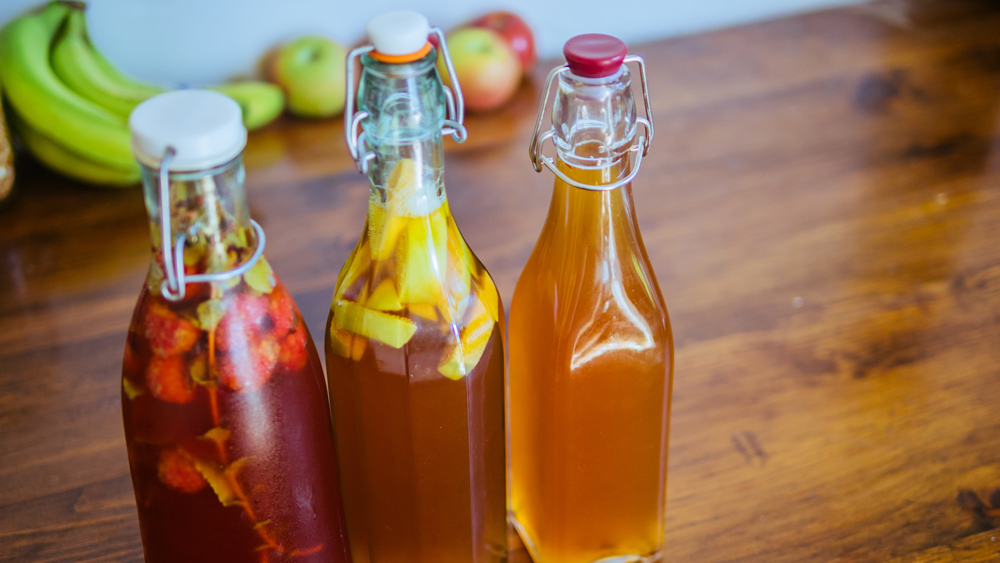The Proven Benefits Of Kombucha Make For Quick Reading
Go ahead and drink kombucha if you like, but don’t expect miracles from the fermented beverage

Pretty much any food or drink has some benefits, but the longer and more varied that list gets the more suspicious we tend to be. And not many edibles have a longer lists of purported health benefits than kombucha, a fermented tea from east Asia.
But we’re always open to being told we were wrong, and perhaps kombucha is indeed a miracle elixir that should be coming out of all our taps. So we spoke to dietitian Aisling Pigott of the British Dietetic Association to find out what research, if any, has been done into kombucha’s effects, but first let’s look into exactly what kombucha is.
What is kombucha?
Fizzy fermented tea, made with sugar and scoby. If you haven’t got a Scooby what scoby is, it’s an acronym that stands for symbiotic culture of bacteria and yeasts. You can buy some if you’re planning on making your own kombucha at home.
To make kombucha you add the scoby to sweetened black or green tea that has been left to cool, then cover and leave the mixture for a week or so while the magic of fermentation takes place. The result is a fizzy, sweet and sour drink.
What health benefits have been ascribed to kombucha and are any of them backed up by scientific research?
The list of benefits not claimed of kombucha is probably shorter, to be honest. Among other things, kombucha is claimed to bolster the immune system, counteract the effects of ageing, improve digestive health and even help prevent certain cancers. Unfortunately, the science just isn’t there to back up kombucha’s credentials right now.
“There are actually very few studies or evidence of any benefits at present,” says Pigott.
See related
- How To Improve Your Gut Health
- Gut Check: Are You Eating Enough Microbes?
- A Killer Kimchi Recipe from YO! Sushi’s Head Chef
Are there any risks to drinking kombucha?
If you ladle in mounds of sugar into your kombucha then it’s not going to be great for you, but in general it’s not going to be harmful, so if you’ve become addicted to the stuff you can drink on.
Get the Coach Newsletter
Sign up for workout ideas, training advice, reviews of the latest gear and more.
“It depends on the preparation, and sugar and caffeine content,” says Pigott. “As with anything if you enjoy it and find it helpful, then great! Otherwise it’s probably not going to be a miracle cure.”
Does drinking kombucha pose any risk to your dental health?
“Persistent long-term consumption can damage the enamel of the teeth, especially if you are constantly sipping on such drinks throughout the day,” says Dr Ruth Baidoo, a private dentist and ambassador for mouthwash maker Waken Mouthcare. “This is because it is highly acidic. Some brands of kombucha also add a lot of sugar to the drink, and we all know how damaging an excess of sugar can be to dental health.
“One of the signs of kombucha consumption affecting your dental health is that your teeth will start to appear darker in colour and more stained. This is most likely to be because your enamel – the white part of the teeth – is slowly being worn away by the acidity of the kombucha.
“If you are finding it difficult to limit your intake of kombucha, use a straw (ideally a stainless-steel reusable one) to reduce the contact of kombucha with your teeth.”

Nick Harris-Fry is a journalist who has been covering health and fitness since 2015. Nick is an avid runner, covering 70-110km a week, which gives him ample opportunity to test a wide range of running shoes and running gear. He is also the chief tester for fitness trackers and running watches, treadmills and exercise bikes, and workout headphones.









